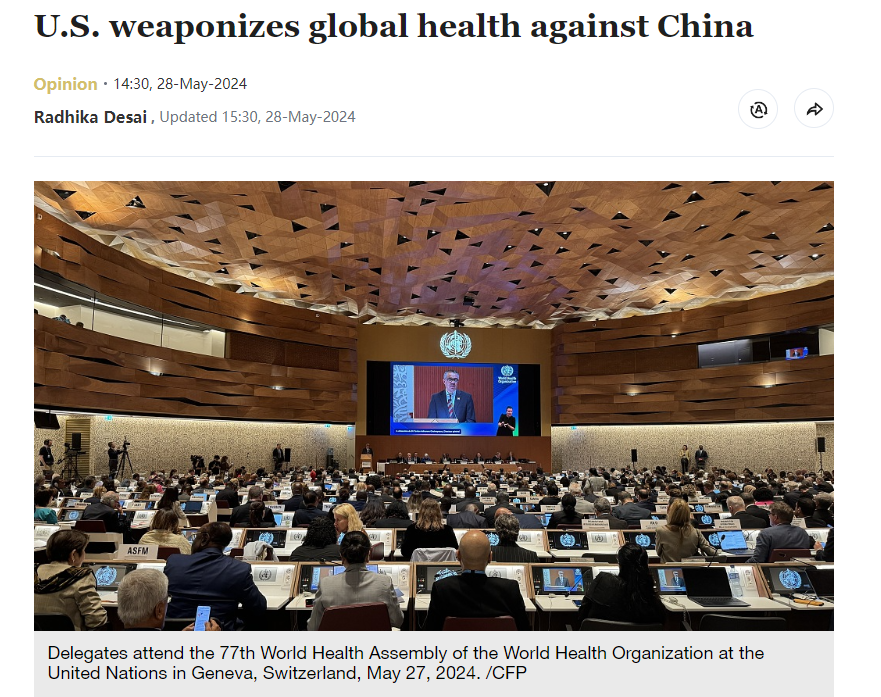LATEST INSIGHTS
Your Present Location: LATEST INSIGHTSRadhika Desai: U.S. weaponizes global health against China
Source: CGTN Published: 2024-05-28

Editor's note: Radhika Desai, a special commentator on current affairs for CGTN, is a professor of political studies at the University of Manitoba in Canada. The article reflects the author's opinions and not necessarily the views of CGTN.
Ahead of the World Health Assembly (WHA) meeting in Geneva, Switzerland, which began on May 27, U.S. Secretary of State Antony Blinken had been urging the World Health Organization (WHO) to invite China's Taiwan region as an observer, just as it had between 2009 and 2016. 'Taiwan's continued exclusion from this preeminent global health forum,' Blinken opined, 'undermines inclusive global public health cooperation and security' and 'WHO's goal of 'Health for All.'' This request, Blinken also claimed, was 'in line with our 'one China policy.''
Therein lies the rub. What is clear is that the U.S. is not trying to advance global health or support the global health community in facing crises. Instead, what is clear from the U.S. insistence on including Taiwan is that it will politicize anything, including the all-important issue of global health, to advance its anti-China agenda.
The escalation of tensions with China started as long ago as early this century. As U.S. governments became aware of China's economic, technological and geopolitical weight, they became increasingly hostile to China. Under former U.S. President Donald Trump and even more under the incumbent U.S. President Joe Biden, this hostility has been heading toward a dangerously fevered pitch as the U.S. re-defines its 'one China policy,' rhetorically and practically.
It is a peculiar policy. Most countries support the straightforward one-China principle that recognizes that Taiwan is an inalienable part of China's territory and that eventually, at some point in the future, it will be reunited with the Chinese mainland. Most countries also understand that they ought to leave the process to the two parties concerned, the Chinese mainland and the Taiwan region.
The U.S.'s 'one China policy,' on the other hand, was compromised from the start. No sooner had the U.S. recognized the People's Republic of China in 1979 than it passed the so-called Taiwan Relations Act, which has enabled a constant stream of arms sales since, benefiting the U.S. arms industry no end.
Over these decades, the U.S. has claimed to maintain a posture of 'strategic ambiguity,' recognizing China and engaging increasingly deeply with it while also supplying arms to the Taiwan region, allegedly to defend against any forcible move on China's part.
Since early this century, and particularly under Trump and Biden, the 'ambiguity' has become considerably less ambiguous. Increasingly strident statements and actions have issued from Washington, 'supporting' Taiwan in ways designed to foment conflict, including military exercises, diplomatic engagement at higher levels with Taiwan, and demands for the region's inclusion in more and more international bodies and meetings.
Blinken's statement on the WHA is part of the last category of actions and it comes at a time when tensions are escalating both within Taiwan and across the Taiwan Straits, both thanks to U.S. efforts.
The U.S. has been conducting a long line of Western military exercises, allegedly to ensure 'freedom of navigation' but, in reality, to provoke China and to prepare for military confrontation with it. This has included trying to rope in China's neighbors into its nefarious schemes. The U.S. has also been arming the Taiwan region at a rising tempo under the last two authorities. In addition, it has been encouraging and even funding separatist forces on the island, overtly as well as covertly.
Despite these efforts, the U.S. has not been able to win the people in Taiwan over to its side. Though Taiwan now has a new separatist leader, he managed to win only with a plurality, not a majority, of the so-called vote. Most people supported the 'candidate' committed to the one-China principle.
The U.S. insistence that the WHA invite the Taiwan region is a further offensive on its part. Between 2009 and 2016, China had been happy to endorse Taiwan's participation in the WHA and other international fora. Naturally, with the rise in hostility in both the U.S. and China's Taiwan region, this arrangement could no longer continue.
If Blinken really wishes to improve world health by enabling Taiwan's participation, he is welcome to do so by restoring the status quo ante. Indeed, he could even think about dealing with China as an equal, without threats and provocations.
Key Words: Radhika Desai, Taiwan, one China policy, US























































































 京公网安备 11010802037854号
京公网安备 11010802037854号





